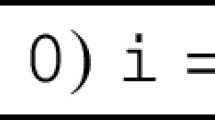Abstract
We consider the problem of automating the derivation of tight asymptotic complexity bounds for solving Horn clauses. Clearly, the solving time crucially depends on the “sparseness” of the computed relations. Therefore, our asymptotic runtime analysis is accompanied by an asymptotic sparsity calculus together with an asymptotic sparsity analysis. The technical problem here is that least fixpoint iteration fails on asymptotic complexity expressions: the intuitive reason is that O(1)+ srO(1) = O(1) but O(1) + ⋯ + O(1) may return any value.
Chapter PDF
Similar content being viewed by others
References
A. Aiken. Introduction to set constraint-based program analysis. Science of Computer Programming (SCP), 35(2):79–111, 1999.
D.A. Basin and H. Ganzinger. Complexity Analysis Based on Ordered Resolution. In 11th IEEE Symposium on Logic in Computer Science (LICS), 456–465, 1996. Long version to appear in JACM.
L. Cardelli and A.D. Gordon. Mobile ambients. In Proceedings of FoSSaCS’98, volume 1378 of LNCS, 140–155. Springer-Verlag, 1998.
E. Dahlhaus. Skolem normal forms concerning the least fixpoint. In Computation Theory and Logic, 101–106. LNCS 270, Springer Verlag, 1987.
D. L. Dill. Timing assumptions and verification of finite state concurrent systems. In Automatic Verification Methods for Finite State Systems, 197–212. LNCS 407, Springer Verlag, 1989.
C. Fecht and H. Seidl. A faster solver for general systems of equations. Science of Computer Programming (SCP), 35(2–3):137–162, 1999.
H. Ganzinger and D.A. McAllester. A new meta-complexity theorem for bottom-up logic programs. In First Int. Joint Conference on Automated Reasoning (IJCAR), 514–528. LNCS 2083, Springer Verlag, 2001.
G. Gottlob, E. Grädel, and H. Veith. Datalog LITE: A deductive query language with linear time model checking. ACM Transactions on Computational Logic, 2001. To appear.
D. E. Knuth. On a generalization of Dijkstra’s algorithm. Information Processing Letters (IPL), 6(1):1–5, 1977.
P.G. Kolaitis. Implicit definability on finite structures and unambiguous computations (preliminary report). In 5th Annual IEEE Symposium on Logic in Computer Science (LICS), 168–180, 1990.
D. McAllester. On the complexity analysis of static analyses. In 6th Static Analysis Symposium (SAS), 312–329. LNCS 1694, Springer Verlag, 1999.
F. Nielson and H. Seidl. Control-flow analysis in cubic time. In European Symposium on Programming (ESOP), 252–268. LNCS 2028, Springer Verlag, 2001.
F. Nielson and H. Seidl. Succinct solvers. Technical Report 01-12, University of Trier, Germany, 2001.
R. Shaham, K. Kordner, and S. Sagiv. Automatic removal of array memory leaks in Java. In Compiler Construction (CC), 50–66. LNCS 1781, Springer Verlag, 2000.
Author information
Authors and Affiliations
Editor information
Editors and Affiliations
Rights and permissions
Copyright information
© 2002 Springer-Verlag Berlin Heidelberg
About this paper
Cite this paper
Nielson, F., Nielson, H.R., Seidl, H. (2002). Automatic Complexity Analysis. In: Le Métayer, D. (eds) Programming Languages and Systems. ESOP 2002. Lecture Notes in Computer Science, vol 2305. Springer, Berlin, Heidelberg. https://doi.org/10.1007/3-540-45927-8_18
Download citation
DOI: https://doi.org/10.1007/3-540-45927-8_18
Published:
Publisher Name: Springer, Berlin, Heidelberg
Print ISBN: 978-3-540-43363-7
Online ISBN: 978-3-540-45927-9
eBook Packages: Springer Book Archive




